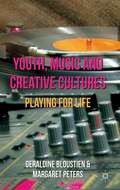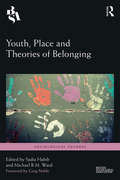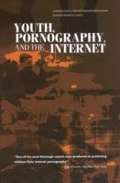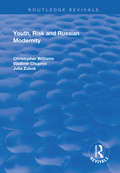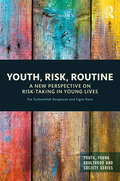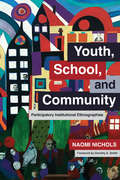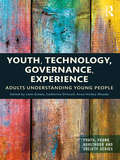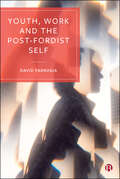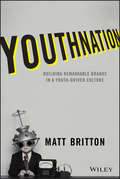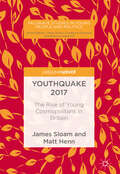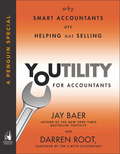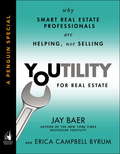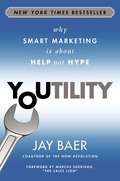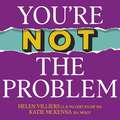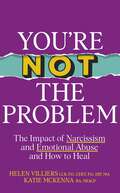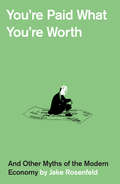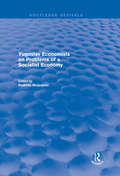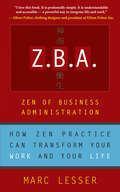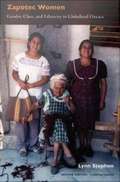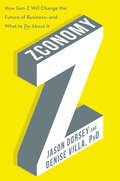- Table View
- List View
Youth, Music and Creative Cultures
by Geraldine Bloustien Margaret PetersYouth, Music and Creative Cultures demonstrates the power of music in the lives of many disadvantaged youth. It offers an evocative cross-cultural exploration into the everyday lives and music practices of young people from seven very different urban locales in Australia, the UK, the US and Europe. They document their passion for music from their own broad social, cultural and ethnic perspectives, using their own video and camera footage to reflect on their learning processes and music activities. These narratives, alongside the views and observations of their peers and mentors, are presented in a dialogic format that both supports and challenges the views and analysis of the authors.
Youth, Place and Theories of Belonging (Sociological Futures)
by Sadia Habib Greg Noble Michael R. M. WardDrawing on interdisciplinary perspectives, Youth, Place and Theories of Belonging showcases cutting-edge empirical research on young people’s lifeworlds. The scholars demonstrate that belonging is personal, infused with individual and collective histories as well as interwoven with conceptions of place. In studying how young people adapt to social change the research highlights the plurality of belonging, as well as its temporal and fleeting nature. In the field of youth studies, we have seen a recent emphasis on studying the ways youth live out everyday multiculturalisms in an increasingly globalised world. How young people negotiate belonging in everyday life and how they come to understand their positions in fragmented societies remain emerging areas of scholarship. Composed of twelve chapters, the collection references key sites and institutions in young people’s lives such as schools, community/cultural centres, neighbourhoods and spaces of consumption. Drawing from diverse areas such as the rural, the urban as well as displacements and mobilities, this international collection enhances our understanding of the theories employed in the study of youth identity practices. Written in a direct and clear style, this collection of essays will be of interest to researchers working in geography, theories of affect, gender, mobility, performativities, and theories of space/place. Investigating how young people come to belong can open up new spaces and provide critical insights into young people’s identities.
Youth, Pornography, And The Internet
by Committee to Study Tools Strategies for Protecting Kids from Pornography Their Applicability to Other Inappropriate Internet ContentThe Internet has changed the way we access the world. This is especially true for kids, who soak up new technologies like eager little sponges. They have access to an enormous array of material, including educational links, sports info, chat rooms—and, unfortunately, pornography. But we must approach our need to protect children with care to avoid placing unnecessary restrictions on the many positive features of the Internet. Youth, Pornography, and the Internet examines approaches to protecting children and teens from Internet pornography, threats from sexual predators operating on-line, and other inappropriate material on the Internet. The National Research Council’s Computer Science and Telecommunications Board explores a number of fundamental questions: Who defines what is inappropriate material? Do we control Internet access by a 17-year-old in the same manner as for a 7-year-old? What is the role of technology and policy in solving such a problem in the context of family, community, and society? The book discusses social and educational strategies, technological tools, and policy options for how to teach children to make safe and appropriate decisions about what they see and experience on the Internet. It includes lessons learned from case studies of community efforts to intervene in kids’ exposure to Internet porn. Providing a foundation for informed debate, this very timely and relevant book will be a must-read for a variety of audiences.
Youth, Risk and Russian Modernity
by Christopher Williams Vladimir ChuprovTitle first published in 2003. This timely and original book is the most comprehensive and authoritative analysis of Russia's risk society to date. Referring to the works of Douglas, Beck and Giddens, it considers a variety of theories of risk and applies them to young people in different risk societies, showing how these youngsters have adapted to cope with risk.
Youth, Risk, Routine: A New Perspective on Risk-Taking in Young Lives (Youth, Young Adulthood and Society)
by Tea Torbenfeldt Bengtsson Signe RavnYoung people’s lives continue to be the topic of public scrutiny and recurring ‘moral panics’. Smoking cannabis, speeding, and engaging in street-level fights are depicted as activities based on ‘poor choices’ or simple hedonism, putting young people’s futures at risk. Based on comprehensive, qualitative research with young people in Denmark, this book illustrates how such individualised accounts miss out on the inherently social character of risk-taking activities. Youth, Risk, Routine introduces a new approach to risk-taking activities as being an integral and routinised part of young people’s everyday life. By applying social theories of practice, this insightful volume presents a framework for understanding the routinised dimensions of young people’s engagement in risk-taking and how this is embedded in, intertwined with, and held in place by other everyday practices. Indeed, through extensive empirical analyses of the rich material at hand, the authors explore how routinisation, coordination, embodiment, and social context are central aspects for understanding how, why, and when young people engage in risk-taking practices. Youth, Risk, Routine will be of interest to students and scholars in sociology, criminology, and social work as well as wider social science audiences, particularly those interested in exploring the empirical potential of social theories of practice.
Youth, School, and Community: Participatory Institutional Ethnographies (G - Reference, Information And Interdisciplinary Subjects Ser.)
by Naomi NicholsUnlike other books about youth, this book examines how young people’s experiences of inclusion and exclusion are shaped by extended social relations, coordinating thought and conduct across time and space. Working with young people, using a range of participatory institutional ethnographic strategies, this book investigates the social and institutional relations which differentially punctuate our lives. While research began with what young people know and have experienced, this starting place anchors an investigation of public sector institutions and institutional processes that remain implicated in social-historical-economic processes of global capitalism, imperialism, and colonialism. Youth, School, and Community connects the dots between the abstract objectified accounts produced by institutions and enabling institutional action and accounting practices, and the actual material conditions of young people’s lives and development, which these accounts obscure. By focusing on specific policies and procedures that produce young people’s experiences of racialized inclusion/exclusion, safety/risk make it particularly useful to academics, professionals, and activists who want to ensure that young people experience equitable access to public sector resources and not disproportionate exposure to public sector punishments and punitive interventions.
Youth, Technology, Governance, Experience: Adults Understanding Young People (Youth, Young Adulthood and Society)
by Catherine Driscoll Liam Grealy Anna Hickey-MoodyHow do adults understand youth? How do their conceptions inform interventions into young lives or involve young people’s experiences? This volume tackles these questions by exploring adults’ ideas about youth. Specifically, Youth, Technology, Governance, Experience examines the four titular concepts and their implications for a range of relationships between youth and adults. Utilising interdisciplinary methods, the contributing authors deliver a broad range of analyses of young people differentiated by gender, class, race, and geography across an array of contexts, including within the home, in media representations, through government bureaucracies, and in everyday life. Youth, Technology, Governance, Experience also interrogates the meaning of technology and governance for youth studies, considering a range of ways they interact, including through social media, technologies of regulation, and educational tools. It will appeal to students and academic researchers interested in fields such as youth studies, cultural studies, sociology, and education.
Youth, Work and the Post-Fordist Self
by David FarrugiaIn the past, youth has been seen as a transition into the labour market, but today young people’s identities are increasingly wrapped up in their value as workers. In this book, young people describe the meaning of work in their own words. Drawing on these narratives, the author reveals how their identities are intertwined with the dynamics of labour and value in post-Fordist capitalism and how social inequalities are manifested through the practices and ethics that young people draw upon to cultivate an economically productive self. Illuminating the rapidly changing social conditions that mould youth identities, this book represents a paradigm shift in our understanding of youth and work.
YouthNation: Building Remarkable Brands in a Youth-Driven Culture
by Matt BrittonYouth is no longer an age—it's a commodity YouthNation is an indispensable brand roadmap to the youth-driven economy. Exploring the idea that youth is no longer an age—it's a commodity that's available to everyone—this book shows what it takes to stay connected, agile, authentic, and relevant in today's marketplace. Readers will learn the ins and outs of the new consumer, and the tools, methods, and techniques that ensure brand survival in the age of perpetual youth. Coverage includes marketing in a post-demographic world, crafting the story of the brand, building engaged communities, creating experiences that inspire loyalty and evangelism, and the cutting-edge tricks that help businesses large and small harness the enormous power of youth. The old marketing models are over, and the status quo is dead. Businesses today have to embody the ideals of youth culture in order to succeed, by tapping the new and rapidly evolving resources n business and in life. When everything is changing at the pace of a teenager's attention span, how do businesses future-fit for long-term success? This book provides a plan, and the thoughts, strategies, and brass tacks advice for putting it into action. Use New-Gen psychographics to target markets Build stronger evangelism with a compelling brand narrative Create loyal communities with immersive and engaging experiences Navigate the radically-changed landscape of the future marketplace In today's hyper-socialized, Facebook fanatic, selfie-obsessed world, youth is the primary driver of business and culture. Smart companies are looking to tap into the fountain of youth, and the others are sinking fast. YouthNation is a roadmap to brand relevancy in the new economy, giving businesses turn-by-turn direction to their market destination.
Youthquake 2017: The Rise of Young Cosmopolitans in Britain (Palgrave Studies in Young People and Politics)
by Matt Henn James SloamThis book is open access under a CC BY 4.0 license.This book investigates the reasons behind the 2017 youthquake – which saw the highest rate of youth turnout in a quarter of a century, and an unprecedented gap in youth support for Labour over the Conservative Party – from both a comparative and a theoretical perspective. It compares youth turnout and party allegiance over time and traces changes in youth political participation in the UK since the onset of the 2008 global financial crisis – from austerity, to the 2016 EU referendum, to the rise of Corbyn – up until the June 2017 General Election. The book identifies the rise of cosmopolitan values and left-leaning attitudes amongst Young Millennials, particularly students and young women. The situation in the UK is also contrasted with developments in youth participation in other established democracies, including the youthquakes inspired by Obama in the US (2008) and Trudeau in Canada (2015).
Youtility for Accountants
by Jay Baer Darren RootYoutility fundamentally changes how accountants and accounting firms think about marketing and their business. Jay Baer defines "Youtility" as information and resources given away for free to build awareness and trust. Youtility creates awareness, customers, and loyalty over the long-term. Due to enormous shifts in technology and consumer behavior, customers want a new approach that cuts through the clutter: marketing that is truly, inherently useful. The difference between helping and selling is just two letters, but embracing the former makes the latter much, much easier. Meticulously researched, and filled with examples of accountants and accounting firms that have accelerated their business enormously by embracing the principle of Youtility marketing, this special ebook from best selling authors Jay Baer and Darren Root provides a groundbreaking plan for using information and helpfulness to transform the relationship between companies and customers. Based on the New York Times best seller Youtility, this is the playbook for modern marketing effectiveness in the accounting industry.
Youtility for Real Estate
by Jay Baer Erica Campbell ByrumHow real estate professionals can build trust and dominate their competition by creating truly useful marketing. Youtility, as defined by bestselling author Jay Baer, is marketing that people cherish instead of marketing they simply tolerate. Due to enormous shifts in technology and consumer behavior, customers want a new approach that cuts through the clutter: marketing that is truly, inherently useful. Smart real estate professionals are applying the concepts of Youtility, giving away information and resources for free, to differentiate and dominate by providing real value to clients and prospective clients. The difference between helping and selling is just two letters, but embracing the former makes the latter much, much easier. Meticulously researched and filled with examples of residential and multifamily real estate professionals who have accelerated their businesses enormously by embracing the principles of Youtility marketing, this special e-book provides a groundbreaking plan for using information and helpfulness to transform the relationship between real estate pros and their customers. Based on the New York Times bestseller Youtility, this pithy e-book is a must for marketers in the real estate industry.
Youtility: Why Smart Marketing Is about Help Not Hype
by Jay BaerThe difference between helping and selling is just two letters If you're wondering how to make your products seem more exciting online, you're asking the wrong question. <P><P>You're not competing for attention only against other similar products. You're competing against your customers' friends and family and viral videos and cute puppies. To win attention these days you must ask a different question: "How can we help?" Jay Baer's Youtility offers a new approach that cuts through the clutter: marketing that is truly, inherently useful. If you sell something, you make a customer today, but if you genuinely help someone, you create a customer for life.
You’re Not the Problem - Sunday Times bestseller: The Impact of Narcissism and Emotional Abuse and How to Heal
by Helen Villiers Katie McKennaTop 10 Irish Bestseller'Helen & Katie's advice will change your life. It did mine.' - Kay Allinson, co-founder of Pinch of NomThis book will show you what a narcissist looks like and how their emotional abuse impacts the lives and relationships of their families.Many emotionally abusive behaviours from parent to child have become socially acceptable; because they're so prolific, they're normalised. Furthermore, humans often repeat relational patterns, passing the baton of trauma from generation to generation, until someone decides to change things. You're Not the Problem shows you how to recognise these behaviours and realise the profound impact they have had, and still have, and to see the patterns they form in our relationships with parents, partners, friends and colleagues. Using stories and examples from their clinical experience and extensive research, psychotherapists Helen Villiers and Katie McKenna share: · What Narcissistic Personality Disorder is· How to recognise emotional abuse in family relationships· The immediate and long-term impact · Practical strategies for healing· How to avoid repeating these behaviours With a compassionate, sympathetic approach to looking at your familial patterns, Villiers and McKenna show you how to truly break free from these toxic relationships and reclaim your life.
You’re Not the Problem: The Impact of Narcissism and Emotional Abuse and How to Heal
by Helen Villiers Katie McKennaHelen & Katie's advice will change your life. It did mine. - Kay Allinson, co-founder of Pinch of NomThis book will show you what a narcissist looks like and how their emotional abuse impacts the lives and relationships of their families.Many emotionally abusive behaviours from parent to child have become socially acceptable; because they're so prolific, they're normalised. Furthermore, humans often repeat relational patterns, passing the baton of trauma from generation to generation, until someone decides to change things. You're Not the Problem shows you how to recognise these behaviours and realise the profound impact they have had, and still have, and to see the patterns they form in our relationships with parents, partners, friends and colleagues. Using stories and examples from their clinical experience and extensive research, psychotherapists Helen Villiers and Katie McKenna share: · What Narcissistic Personality Disorder is· How to recognise emotional abuse in family relationships· The immediate and long-term impact · Practical strategies for healing· How to avoid repeating these behaviours With a compassionate, sympathetic approach to looking at your familial patterns, Villiers and McKenna show you how to truly break free from these toxic relationships and reclaim your life.
You’re Paid What You’re Worth: And Other Myths Of The Modern Economy
by Jake RosenfeldA myth-busting book challenges the idea that we’re paid according to objective criteria and places power and social conflict at the heart of economic analysis.Your pay depends on your productivity and occupation. If you earn roughly the same as others in your job, with the precise level determined by your performance, then you’re paid market value. And who can question something as objective and impersonal as the market? That, at least, is how many of us tend to think. But according to Jake Rosenfeld, we need to think again.Job performance and occupational characteristics do play a role in determining pay, but judgments of productivity and value are also highly subjective. What makes a lawyer more valuable than a teacher? How do you measure the output of a police officer, a professor, or a reporter? Why, in the past few decades, did CEOs suddenly become hundreds of times more valuable than their employees? The answers lie not in objective criteria but in battles over interests and ideals. In this contest four dynamics are paramount: power, inertia, mimicry, and demands for equity. Power struggles legitimize pay for particular jobs, and organizational inertia makes that pay seem natural. Mimicry encourages employers to do what peers are doing. And workers are on the lookout for practices that seem unfair. Rosenfeld shows us how these dynamics play out in real-world settings, drawing on cutting-edge economics, original survey data, and a journalistic eye for compelling stories and revealing details.At a time when unions and bargaining power are declining and inequality is rising, You’re Paid What You’re Worth is a crucial resource for understanding that most basic of social questions: Who gets what and why?
Yugoslav Economists on Problems of a Socialist Economy
by Radmila StojanovicThis title was first published in 1964
Yugoslavia in the Shadow of War
by John Paul NewmanThe Yugoslav state of the interwar period was a child of the Great European War. Its borders were superimposed onto a topography of conflict and killing, for it housed many war veterans who had served or fought in opposing armies (those of the Central Powers and the Entente) during the war. These veterans had been adversaries but after 1918 became fellow subjects of a single state, yet in many cases they carried into peace the divisions of the war years. John Paul Newman tells their story, showing how the South Slav state was unable to escape out of the shadow cast by the First World War. Newman reveals how the deep fracture left by war cut across the fragile states of 'New Europe' in the interwar period, worsening their many political and social problems and bringing the region into a new conflict at the end of the interwar period.
Yugoslavia: Socialism, Development and Debt (Routledge Revivals)
by David DykerThis book, first published in 1990, analyses contemporary Yugoslavian development strategy in its historical and political context, assessing how corruption, negligence, and an emphasis on industry to the detriment of agriculture and trade, have all played a part in bringing Yugoslavia close to financial and political chaos. The book concludes by considering the contemporary prospects for a more integrated policy approach in the midst of the country's political crisis.
Yārsān of Iran, Socio-Political Changes and Migration
by S. Behnaz HosseiniThis book examines how socio-political surroundings have affected the evolution of Yārsāni religious thought and why the Yārsāni religious belief, despite its fundamental disagreement with Islamic tenets, has been affiliated with Islam. It also considers the historical context and socio-religious milieu in which the Yārsāni belief appropriates religious forces to survive, how Yārsānis experience their religion in Islamic society, and what differences are significant in their lived experiences. The author explores how the experience of worship influences real life for the Yārsānis from the perspectives of sociology, behaviorism, content analysis, cultural studies and ethnography in Iran and diaspora with focus on Sweden. Yārsāni followers became known as those who “don’t tell secrets,” primarily because they were not allowed to promote and advertise their religion in public, but recently have started to reveal their religion, especially in social media. This book discovers the transformation of this religion, and in particular in which context an individual can change the content of religion, and bring about new ideas regarding religion and belief.
Z.B.A.: Zen of Business Administration
by Marc LesserEntrepreneur Marc Lesser built his company, Brush Dance, from a tiny recycled-paper venture operated out of his garage into a multimillion-dollar publisher of greeting cards and calendars. Armed with an MBA, this founder and CEO grappled with the usual challenges of running a company: meeting payroll and balancing cashflow, hiring and firing employees, and maintaining relationships with vendors and customers. Informing every decision was Lesser’s commitment to Zen practice. As an ordained Zen priest, he has practiced and studied Zen for thirty years. In Z.B.A. he follows the great spiritual tradition of teaching stories to beautifully describe the delicate path of living a working life as a spiritual practice.
Zahlungen für Ökosystemdienstleistungen: Zwischen Marktprinzipien und Kommunikation
by Kristin NicolausKristin Nicolaus erarbeitet in diesem Buch eine diskursdemokratische Perspektive auf Zahlungen für Ökosystemdienstleistungen (PES). Sie rückt die Kommunikationen und Möglichkeiten der Partizipation in den Mittelpunkt und analysiert – mittels qualitativer Inhaltsanalyse – 18 Entstehungsprozesse von PES in Deutschland und Großbritannien. Aus der empirischen Untersuchung ergeben sich Erkenntnisse, die bisher kaum Beachtung fanden und Aussagen darüber treffen, wie vielfältig PES zustande kommen und welchen Einfluss die jeweiligen Kontexte darauf nehmen. Die gewonnenen Einsichten setzen sich von bisher vorherrschenden Funktionslogiken ab und erweitern so das Bild von Zahlungen für Ökosystemdienstleistungen.
Zapotec Women: Gender, Class, and Ethnicity in Globalized Oaxaca
by Lynn StephenIn this extensively revised and updated second edition of her classic ethnography, Lynn Stephen explores the intersection of gender, class, and indigenous ethnicity in southern Mexico. She provides a detailed study of how the lives of women weavers and merchants in the Zapotec-speaking town of Teotitln del Valle, Oaxaca, have changed in response to the international demand for Oaxacan textiles. Based on Stephen's research in Teotitln during the mid-1980s, in 1990, and between 2001 and 2004, this volume provides a unique view of a Zapotec community balancing a rapidly advancing future in export production with an entrenched past anchored in indigenous culture. Stephen presents new information about the weaving cooperatives women have formed over the last two decades in an attempt to gain political and cultural rights within their community and standing as independent artisans within the global market. She also addresses the place of Zapotec weaving within Mexican folk art and the significance of increased migration out of Teotitln. The women weavers and merchants collaborated with Stephen on the research for this book, and their perspectives are key to her analysis of how gender relations have changed within rituals, weaving production and marketing, local politics, and family life. Drawing on the experiences of women in Teotitln, Stephen considers the prospects for the political, economic, and cultural participation of other indigenous women in Mexico under the policies of economic neoliberalism which have prevailed since the 1990s.
Zconomy: How Gen Z Will Change the Future of Business—and What to Do About It
by Jason R. Dorsey Denise VillaThe most complete and authoritative guide to Gen Z, describing how leaders must adapt their employment, sales and marketing, product, and growth strategies to attract and keep this important new generation of customers, employees and trendsetters.Gen Z changes everything. Today’s businesses are not built to sell and market the way Gen Z shops and buys, or to recruit and employ Gen Z the way they find and keep jobs. Leaders need answers now as gen Z is the fastest growing generation of employees and the most important group of consumer trendsetters. The companies that quickly and comprehensively adapt to Gen Z thinking will be the winners for the next twenty years. Those that don’t will be the losers or become extinct. Zconomy is the comprehensive survival guide on how leaders must understand and embrace Generation Z. Researched and written by Dr. Denise Villa and Jason Dorsey from The Center for Generational Kinetics, the insights in Zconomy are based on their extensive research, they’ve led more than 60 generational studies, and their work with more than 500 companies around the world.In Zconomy, Dr. Villa and Dorsey answer: Who is Gen Z? What do employers, marketers, and sales leaders need to know? And, most importantly, what should leaders do now?This is the critical moment for leaders to understand and adapt to Gen Z or become irrelevant. Gen Z is already reshaping the world of business and this change is only going to accelerate. Zconomy is the definitive manual that will prepare any executive, manager, entrepreneur, HR or marketing professional to successfully unlock the powerful potential of this emerging generation at this pivotal time.
Zebratown
by Greg DonaldsonEight years in the making, this edgy, in-depth account follows a black felon’s attempt to find a new life for himself with a white woman in a small-town neighborhood where—as the book’s title implies—such relationships are common. A remarkably intense read, Zebratown reveals a rhythm of life spiked with violence, betrayal, sex, and the emotional dangers created by passionate love. Greg Donaldson’s Zebratown follows the life of Kevin Davis, an ex-con from Brownsville, Brooklyn, who, after his release from prison, moves to Elmira, New York, and takes up with Karen, a young woman with a six-year-old daughter. Kevin is seemingly the embodiment of hip-hop gangsterism—a heavily muscled, feared thug who has beaten a murder rap. And yet, as Donaldson’s stunning reportage reveals, Kevin has survived on the streets and in prison with a sharp intelligence and a rigid code of practical morality and physical fitness while yearning to make a better life for himself and be a better man. Month by month and year by year, Donaldson follows Kevin and Karen’s attempt to make a home together, a quest made harder by Kevin’s difficulty finding legal employment. The dangerous lures of the street remain for him, both in New York City and in Zebratown, and he is not always successful at avoiding them. Meanwhile, as Kevin and Karen struggle, the reader comes to care for them, even as they act in ways that society may not condone. Theirs is a complex story with many moments of drama, suffering, desire, and revelation—a story that is frequently astonishing and unforgettable to the end. Like Adrian Nicole LeBlanc in Random Family, Donaldson explores a largely hidden world; such immersion journalism is difficult to achieve but uniquely powerful to read. In addition to spending long periods with Kevin and Karen, Donaldson interviews policemen, judges, family members, and others in Kevin and Karen’s orbit, providing a remarkably panoramic account of their lives. Relationships between white women and black men have long been a hot issue in American culture. Even years after the 2008 presidential election, when society has in some ways seemingly moved on to a "postracial" perspective, people still have a lot to say about interracial relationships. Zebratown takes us into the heart of one and offers the paradoxical truth that while race is rarely not an issue in such relationships, in the end, what transpires between a couple is intensely individual. Meanwhile, the difficulty that ex-cons have successfully reentering society is an ongoing problem—for them, their families, and the communities where they live. Zebratown makes this struggle real, as Kevin Davis confronts not only his criminal record and his poor formal education but the cruelties of the postindustrial economy. Both his and Karen’s stories resonate powerfully with twenty-first-century American reality, and in telling them, Greg Donaldson confirms his position as one of the most intrepid journalists at work today.
